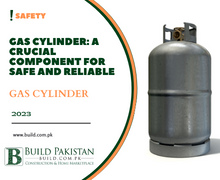Gas Cylinder: A Crucial Component for Safe and Reliable

Introduction:
Gas cylinders play a vital role in our daily lives, providing
a convenient and reliable source of energy for various purposes. Whether it's
for cooking, heating, or powering appliances, gas cylinders are widely used in
homes, restaurants, and industries. In this comprehensive blog, we will delve
into the world of gas cylinders, exploring their construction, types, safety
features, maintenance and their importance in ensuring a safe and efficient
energy supply.
Understanding Gas Cylinders
Gas cylinders are specially designed containers used for
storing and transporting compressed gases. They are typically made of
high-quality materials such as steel or aluminum, ensuring strength and
durability to withstand the pressure of the gas stored inside. The cylinders
feature valves, regulators, and safety devices to control the flow of gas and
maintain safe usage.

Types of Gas Cylinders
a. Liquefied Petroleum Gas (LPG) Cylinders:
LPG cylinders are
the most common type used in households for cooking and heating purposes. LPG,
a mixture of propane and butane gases, is stored under high pressure in these
cylinders. They come in various sizes to cater to different needs, ranging from
small domestic cylinders to larger commercial cylinders.
b. Industrial Gas Cylinders:
Industrial gas cylinders are
used in various industries, including manufacturing, healthcare, welding, and
research laboratories. These cylinders store gases such as oxygen, nitrogen,
acetylene, and helium, which are crucial for different industrial processes.
c. Specialty Gas Cylinders:
Specialty gas cylinders are
designed to store and transport specific gases used in specialized
applications, such as medical gases, calibration gases, and specialty gases
used in laboratories and research facilities.

Safety Features and Regulations
Gas cylinders are subject to stringent safety regulations to ensure their proper handling and usage. Some key safety features include:
a. Pressure Relief Valve:
Gas cylinders are equipped with pressure relief valves that release
excess pressure if it exceeds the safe limit preventing cylinder rupture.
b. Pressure Regulator:
A pressure regulator controls the flow of gas from the cylinder to the
appliance, maintaining a steady and controlled supply.
c. Cylinder Markings:
Each gas cylinder has specific markings
indicating the type of gas it contains, the maximum pressure it can handle, and
other safety-related information.
d. Cylinder Inspection and Testing:
Gas cylinders undergo
periodic inspection and testing to ensure their structural integrity and
compliance with safety standards.
Importance in Energy Supply
Gas cylinders play a crucial role in providing a safe and reliable energy supply for various applications. Some key reasons for their importance include
a. Convenience and Portability:
Gas cylinders offer the
convenience of portable energy, allowing users to use gas-powered appliances in
any location without the need for a fixed gas supply connection.
b. Versatility:
Gas cylinders can be used for multiple
purposes, including cooking, heating, powering generators, and outdoor
activities such as camping and barbecues.
c. Cost-Effective:
Gas cylinders, especially LPG cylinders,
are a cost-effective energy option compared to other sources. They provide
efficient energy with relatively low operating costs.
d. Reduced Environmental Impact:
Clean-burning gases like LPG
produce fewer emissions compared to traditional fossil fuels, contributing to
reduced environmental impact and improved air quality.
Safe Handling and Maintenance
To ensure the safe usage of gas cylinders, it is important to follow proper handling and maintenance practices. Some essential tips include:
a. Store cylinders in well-ventilated areas, away from heat sources and flammable materials.
b. Ensure proper installation and connection of gas cylinders to appliances, following manufacturer guidelines.
c. Regularly check for leaks using soapy water or a leak detection solution and never use a cylinder if you suspect a leak.
d. Keep cylinders upright and secure to prevent accidental
tipping or damage.
e. Follow proper storage, transportation, and disposal regulations as per local guidelines.
Conclusion:
Gas cylinders are indispensable components of our
energy infrastructure, providing a safe, convenient, and reliable energy source
for various applications. With their versatility, safety features, and
adherence to regulations, gas cylinders ensure the efficient utilization of
gases while prioritizing user safety. By understanding their types, safety
features, and maintenance requirements users can harness the benefits of gas
cylinders while ensuring a sustainable and secure energy supply.









